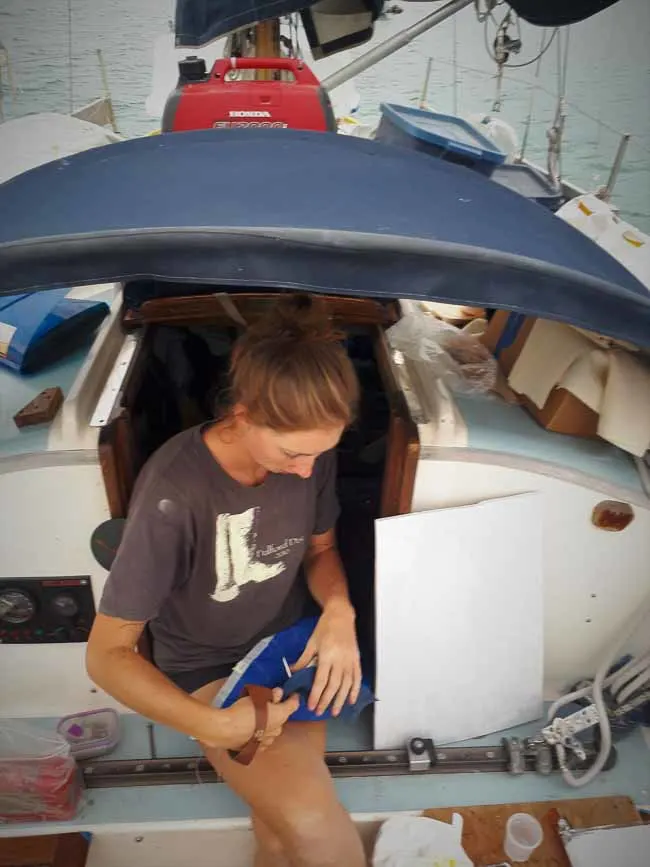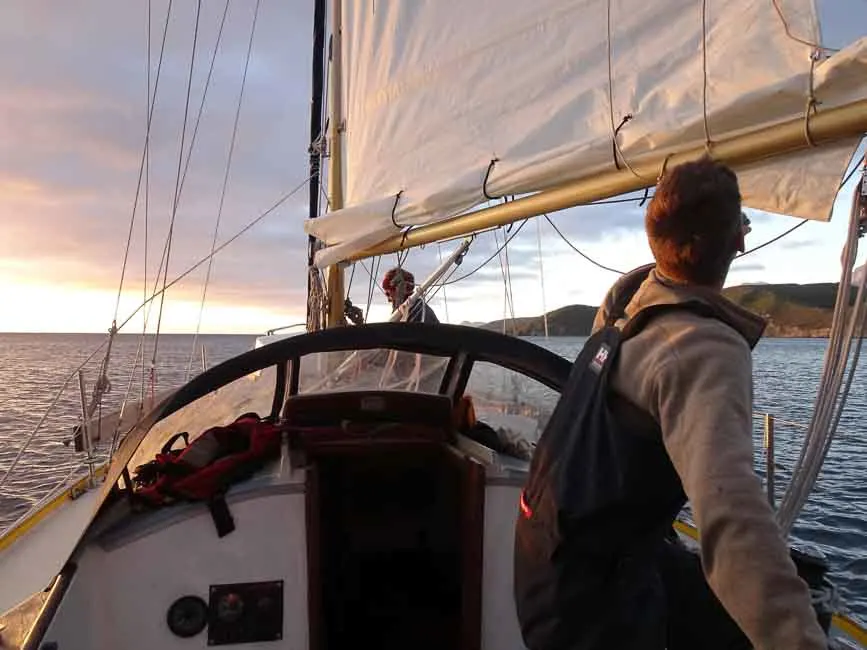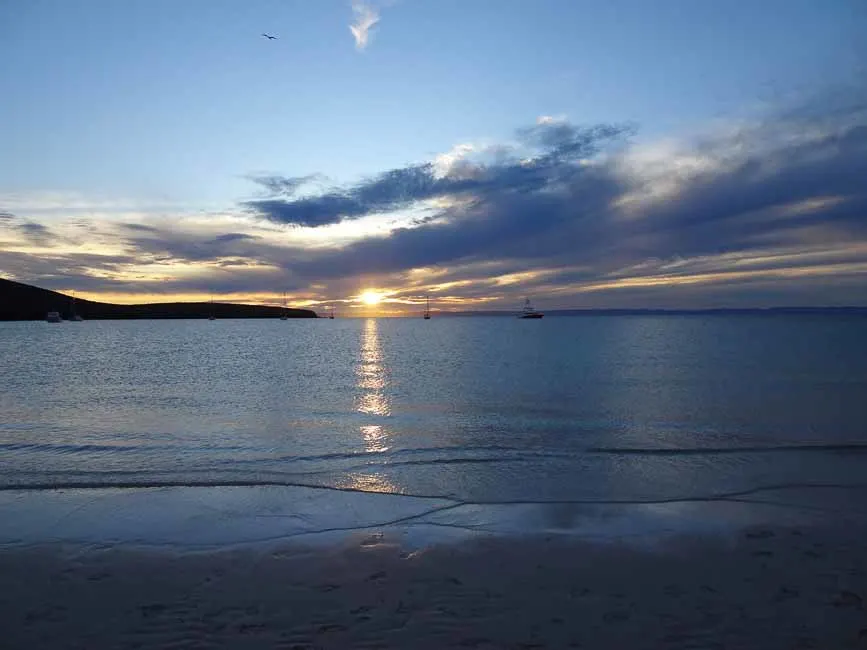
Hilary mending a sail as we prepared (naively) for the Pacific crossing. Photo by Liam Johnston, Mar 2020.
Change of plans – How sailing can help us navigate life’s changes
Guest poster Hilary Thompson is a young cruiser who was embarking on a Pacific crossing when COVID-19 brought travel to a halt. She shares her story and how lessons learned from sailing helped her cope in a time of unprecedented change.
We were ready to go. My partner Liam and I and our tiny but mighty sailing home, SV Wild Rye, had made the long journey south from our home in BC’s Gulf Islands to our current anchorage in La Paz, Mexico. We had spent the past two and a half years alternately fixing up Wild Rye and cultivating our sailing skills, with the goal of doing what Liam had been scheming about since he was a kid: sailing across the Pacific Ocean.
For possibly the first time in the history of our relationship, we were ready on time: the rig was strong and new, the sails had been mended, the windvane had received its annual overhaul, and what felt like a thousand other small tasks had been crossed off our infinitely long list. We had found a crew member, a spunky Israeli hitchhiker on her way to New Zealand. She and I began the satisfying task of provisioning, stacking boxes of cans and bags of rice against the wall in her hostel, ready for the day when it could be stowed on board. With two weeks to go until our proposed departure window, we were feeling pretty darn smug.
We had been hearing about the spread of the novel coronavirus, of course, and following it closely on the news, but we never dreamed that it would affect us in a meaningful way. After all, what could be safer than self isolating on a sailboat in the middle of the ocean? I had done what I could to prepare for travel complications: we were scheduled to get health check-ups shortly before our departure, and I had a thermometer and health log ready to track any symptoms during the crossing.

Liam and Hilary during a sunrise sail in the Sea of Cortez. Photo by Scott Bell, Jan 2020.
The turning point came when Liam and I decided to hitchhike to Todos Santos for a weekend of rest. Unlike La Paz, where a thin veil of normalcy still masked the inevitable, Todos Santos was a ghost town: walking down the main street we saw worried looking vendors, police, a few ambulances, but no tourists. The surf hostel was buzzing as the last remaining patrons tried frantically to decide what to do. Where do full-time travelers go when the world is essentially shut down?
Over the next two days in Todos Santos, we were bombarded with news from the cruising community as the situation rapidly evolved: cruisers in French Polynesia had to quarantine upon arrival; no, they were being sent straight to Pape’ete to clear in; actually, they were being instructed to leave their boats moored in Tahiti and fly home. Cruisers that had departed for the South Pacific were being asked to reroute to Hawaii, and those who had not yet left were unable to get departure clearance from the local port captain. We never did bother to sort out how much was true and how much was hearsay, but the message was clear: this is not the year for travel.
“Two and a half years is a long time to plan a trip, and changing plans at the last minute was like running straight into a brick wall at full tilt.”
We began the interesting mental dance of deciding what to do instead. Two and a half years is a long time to plan a trip, and changing plans at the last minute was like running straight into a brick wall at full tilt. After all the hard work, the idea of not sailing was inconceivable. Should we sail north to Puerto Peñasco? Or perhaps slog upwind back to BC? All the while, messages from concerned family were telling us to cut the bullsh*t and come straight home.

Wild Rye at anchor, Sea of Cortez. Photo by Scott Bell, Jan 2020.
So, in the end, we did: in the span of 48 hours we hauled Wild Rye out at a dry storage facility, prepared her as best we could for what we had to assume would be a long absence, gathered what warm weather clothes we still had and flew home to Canada.
Looking back on our decision making process with the gift of hindsight, I can say that it came down to a balance between self sufficiency and connection. On one hand, we knew that we could stock Wild Rye with food and water to last us months and isolate ourselves in the Gulf of California without changing our cruising lifestyle. On the other hand, we felt like that would leave us at a disadvantage if the Mexican or Canadian borders closed entirely. If we didn’t leave immediately, how long might we be stuck in Mexico before we would be able to return home?

Balandra Bay anchorage at sunset, Sea of Cortez. Photo by Scott Bell, Jan 2020.
The sailing life provides a vast sense of freedom, but in some ways it’s also a trap. If we stayed and continued cruising, we would be alone; we wouldn’t have the benefit of regular internet that virtual lifeline to family and friends that keeps us all connected from afar. Liam and I value our independence very highly, and I have come to love the separation from the world that cruising allows. Just us, the boat, the water, and our surroundings: it’s a simple life. However, in the face of a crisis, we found ourselves craving not freedom and independence, but community. We wanted to be near our parents, to stay informed, and most of all to be able to help in whatever small way we could.
“As much as we value the freedom to cut ties with our landlocked life and follow the breeze, we are not an island. In hard times, we want our friends and family around us…”
That was our first big lesson: as much as we value the freedom to cut ties with our landlocked life and follow the breeze, we are not an island. In hard times, we want our friends and family around us, and even if we need to keep a responsible distance of 6 feet or more, we want to know they are close by.

Wild Rye mid-haul out in Bercovich Boatyard, La Paz. Photo by Liam Johnston, Mar 2020
“The most important gift that the ocean has given us… the lesson that we have very little control over our circumstances, and most of the time all we can do is respond with grace.”
The second big lesson was that, surprisingly, the decision was not a hard one to make. I’m a goal oriented person: once I’ve got a plan, I’ll see it through to completion come hell or high water. This Pacific crossing was the biggest and boldest plan I’ve ever made, and I didn’t expect to let go easily. Somewhere along the way, though, the sailing life has changed us. We’re more flexible now, our lives more fluid; we are better at adapting to the change that is life’s only constant. This, I think, is the most important gift that the ocean has given us, better even than the gift of motion: the lesson that we have very little control over our circumstances, and most of the time all we can do is respond with grace.
I hope that this global shutdown is short and that people can resume working and going to school and doing what they love as soon as possible. In the meantime, I am grateful to know that regardless of what happens, these past few sailing years have taught me how to go with the flow.

Hilary at the helm, motoring in the Sea of Cortez in January. Photo by Scott Bell, Jan 2020.
Hilary is a lover of good books, hot coffee and the great outdoors in any form. She and her whale-obsessed partner spend as much time as possible sailing the Pacific coast. They can currently be found at their home on Salt Spring Island, BC.
Blog: hilarycthom.wixsite.com/wildrye
Instagram: @westcoastwildrye
